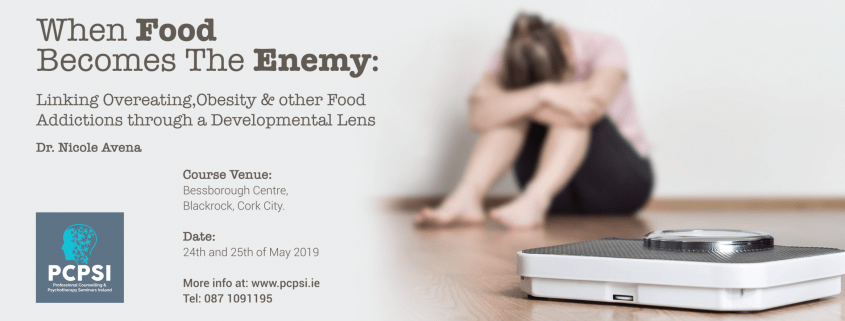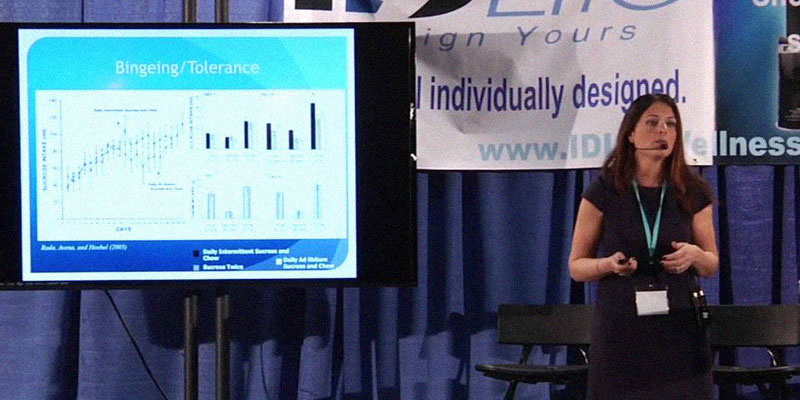May 24 & 25, 2019 | Cork Ireland, When Food Becomes the Enemy: Linking Overeating, Obesity and Other Food Addictions, a 2 day seminar led by Dr Nicole Avena
A 2 day seminar, led by Dr Avena. Tickets.
 This course will review the science of food addiction, and how it manifests in utero, children and adults. It will also offer guidelines on how to mitigate food addiction, and how to recognize and replace foods in one’s diet that can promote addictive overeating. Learning Objectives: To understand the biological basis of addictions To review our modern food environment in terms of the types of foods typically available and consumed To analyze differences between foods and drugs in terms of how we view them psychologically and socially To understand how exposure to certain types of foods early in life can have an impact on brain development and behaviours To review the empirical research studies on food addiction To apply information regarding methods to recognize and reduce added sugars in one’s diet
This course will review the science of food addiction, and how it manifests in utero, children and adults. It will also offer guidelines on how to mitigate food addiction, and how to recognize and replace foods in one’s diet that can promote addictive overeating. Learning Objectives: To understand the biological basis of addictions To review our modern food environment in terms of the types of foods typically available and consumed To analyze differences between foods and drugs in terms of how we view them psychologically and socially To understand how exposure to certain types of foods early in life can have an impact on brain development and behaviours To review the empirical research studies on food addiction To apply information regarding methods to recognize and reduce added sugars in one’s diet
Many of us struggle to maintain a healthy body weight. Most individuals who are overweight, find it difficult to lose weight and keep it off long term. While there are many different reasons why people can become overweight or obese, overeating is clearly a leading cause.
But, why do people overeat? And why do people typically opt to overeat foods that are high in calories and not very nutrient dense, like cookies and chips, as opposed to fruits and vegetables?
One reason why people may overeat, that has become of great interest, has to do with the hedonic (or pleasure) properties of our foods. Our modern food environment has changed in many ways. Not only are we now much more reliant on the use of processed foods, but we are also eating more foods with added sugars and fats. New research suggests that processed foods and additives, like sugars, fats and artificial sweeteners, can result in behavioural changes that resemble an addiction, and this can subsequently lead to a vicious cycle of overeating that is often coupled with dieting attempts, guilt, distress and depression.
These addiction-like eating behaviours include bingeing, feelings of “withdrawal” with trying to abstain from processed food, and craving of foods, especially carbohydrates, which can contribute to more overeating and further perpetuate the addiction.
Excessive eating of highly-processed foods is also associated with changes in the brain which responds in a way that is similar to the effects seen when using a drug, like heroin or cocaine. Brain changes include alterations in neurotransmitters release, neurotransmitter receptor sensitivity and even gene expression. Research also suggests that initial exposures to processed foods, during pregnancy and in early life, can have a long-term impact on the development of addictions. Further, excessive exposure to highly-processed foods early in life is associated with obesity later on, as well as a preference for high-fat foods.
Professional Counseling and Psychotherapy Seminars Ireland (PCPSI).
May 24 8:30 AM- May 25 5:30 PM. 2 Day event.
The Bessborough Centre, Blackrock Cork City, T12 CRA0 Ireland


 Cork, Ireland
Cork, Ireland